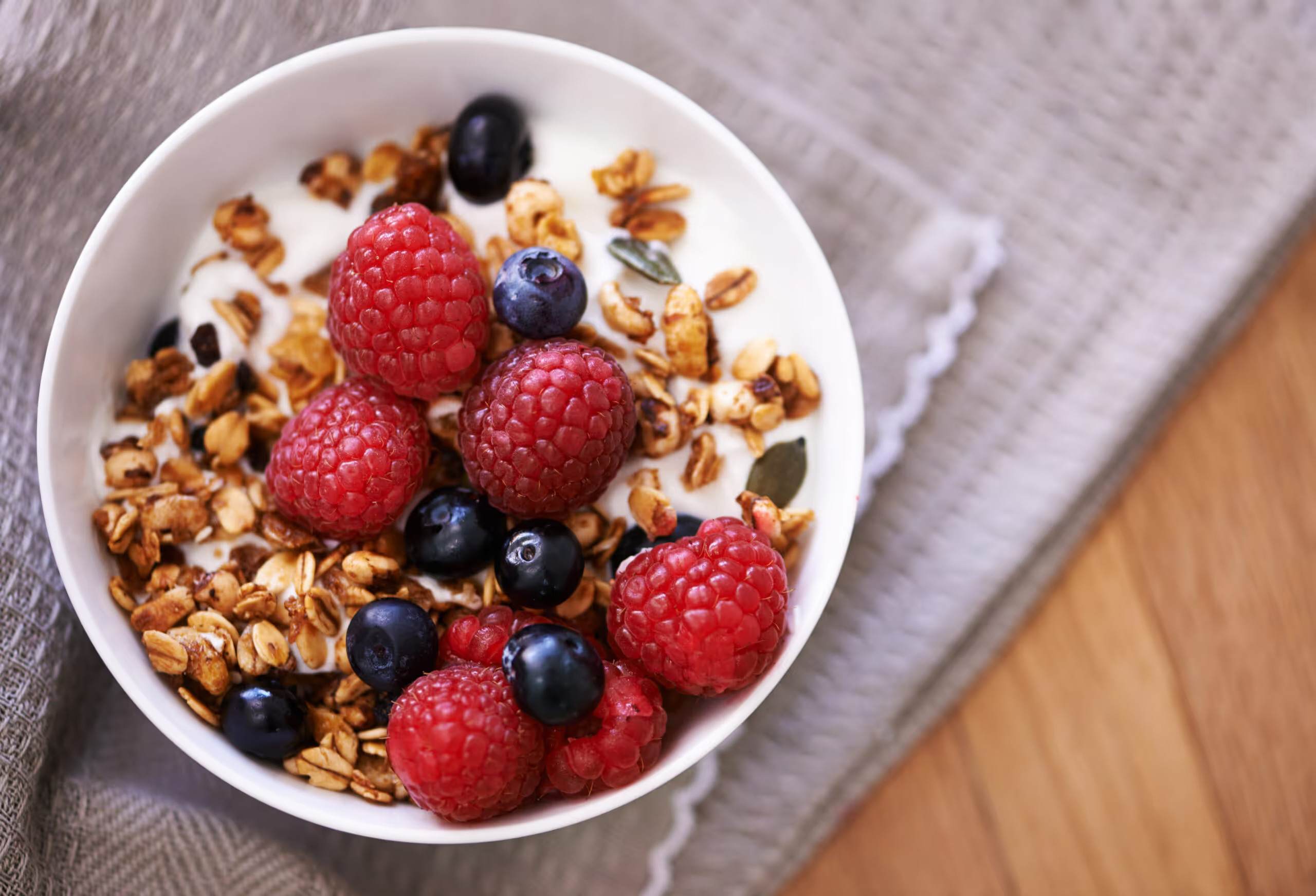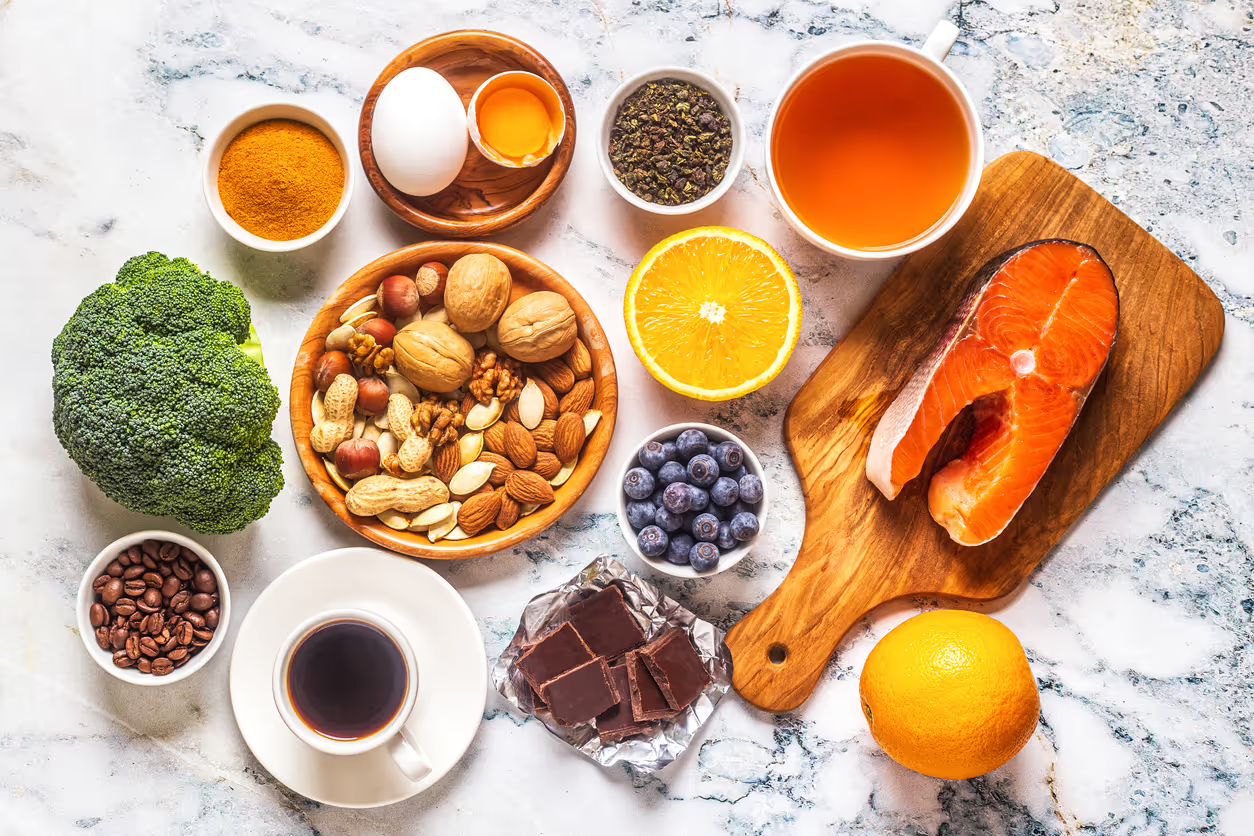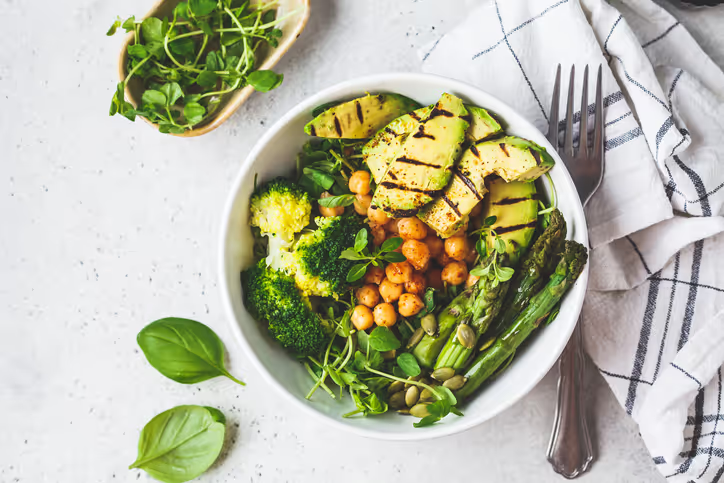We’ve all heard that breakfast is the most important meal of the day, and there is science to back it up. Lots of us pass on breakfast when we’re rushing in the morning to get to school or work, but there are so many healthy breakfast options even if you’re pressed for time. If you’re struggling to come up with ideas for a healthy breakfast for weight loss then look no further!
The truth about the "most important meal of the day"
Eating breakfast is an important part of maintaining weight loss. Adults who skip breakfast regularly are actually at greater risk for obesity and weight gain. According to the National Weight Control Registry, eight in ten adults who maintain weight loss of over 30 pounds for at least a year eat breakfast everyday. This is due to the fact that skipping breakfast can actually lead to increased cravings later in the day as you become hungrier which can make it harder to stick with a healthy diet. Starting the day with a balanced breakfast can help stabilize blood sugar which means fewer cravings, more energy, and more control over your food choices.
However, skipping breakfast is not always a bad thing. There can be some benefits when managed effectively. One study found that skipping breakfast in the morning can lead to individuals consuming fewer calories throughout the day. This follows a conclusion drawn by other studies that skipping breakfast can actually help aid in weight loss when it is not followed by compensation of the calories missed later in the day. So which one is it? Does eating breakfast help or hinder weight loss? There is no one right answer - the impact of including or skipping breakfast can really differ from person to person, so it is best to work with professionals such as a Registered Dietitian to help you figure out what works best for you and your body.
10 Healthy breakfast ideas for weight loss
For many people, starting the day with a healthy, satisfying breakfast can set them up for success in their weight loss journey. This list of 10 breakfast ideas focuses on nutrient-dense foods that provide sustained energy and promote feelings of fullness, making it easier to stick to a calorie-controlled diet while still enjoying delicious and satisfying meals.
1. Oatmeal
Oats are a great option for a quick breakfast in the morning and is so customizable – enjoy classic oatmeal topped with nuts and berries, a savory oat bowl with egg, sweet potato, feta and cherry tomatoes, banana peanut butter oat breakfast cookies, overnight oats, low sugar granola, and so much more. Eating oats helps promote satiety thanks to its high fiber content and low glycemic index to keep you feeling full for hours and avoid the urge to snack between breakfast and lunch. Oats are also heart healthy and can help lower cholesterol levels. Just be mindful of portion size - when it comes to oats for weight loss, aim to stick with a serving size of half a cup. To keep the calories controlled, avoid adding too much sugar from toppings such as honey, brown sugar, dried fruit or syrup, all of which can significantly raise blood sugar levels and actually make you feel hungrier! Instead, try flavoring your oatmeal with low sugar toppings such as berries, cinnamon and nuts. Choose old-fashioned or steel-cut oats which are minimally processed and help slow digestion, keeping you fuller longer. And always aim to balance out your oats with a good protein source such as greek yogurt, protein powder, or nut butter.
2. Eggs
There is a common misperception that eating eggs is not healthy but eggs are actually among the healthiest foods you can eat. Filled with high quality protein, healthy fats, and essential vitamins and minerals, eggs are incredibly nutrient-dense and filling while relatively low in calories. Several studies have shown that egg-based meals, especially when paired with a source of fiber, promote feelings of fullness and reduce food intake later in the day compared with other meals with the same calorie content.
When eating eggs as part of your weight loss plan, it is best to avoid preparing them with saturated fats such as bacon or sausage. Instead, try making a vegetable frittata, breakfast tacos, shakshuka, or a fried egg on avocado toast for leaner options.
3. Nuts & nut butters
Nuts or nut butters are an excellent source of healthy fat to include in your breakfast. Although they are more calorie dense, there have been several calorie controlled studies that have found nuts to actually aid in weight loss as well as improve cholesterol, reduce inflammation, lower the risk for cardiovascular disease, and help manage diabetes. The high protein and fiber content of nuts make them very satiating. In one study, 200 participants ate one serving of peanuts during the day which resulted in fewer calories being consumed overall.
It is important to practice portion control when eating nuts for weight loss, as they are a higher calorie snack. Aim to stick with a ¼ cup serving of unsalted and unflavored nuts and pair them with a fruit or vegetable for a balanced, healthy snack. Get creative and go nuts – throw some nuts into stir frys, soups, salads, and desserts.
4. Yogurt
Creamy, delicious and satisfying, yogurt makes an excellent addition to a weight loss diet. Yogurt contains beneficial probiotics that aid in promoting a healthy digestive system, maintaining immunity, and preventing bacterial infections. It is best to choose yogurts that are high in protein such as Greek yogurt, and low in added sugars. A little label reading trick: when scanning yogurt labels, choose a yogurt with more grams of protein than sugar. Common mistakes that can result in weight gain from consuming yogurt are adding too many sweeteners, focusing on the calorie count rather than protein when selecting a yogurt, and only buying fat free yogurt that might be less filling and overcompensating in another area such as sugar. Yogurt can be a great quick breakfast for when you are rushing to get out of the house in the morning. Try using plain greek yogurt in place of sour cream, adding a dollop of yogurt to a baked apple/peach for a healthy dessert, or enjoy a yogurt parfait customized with your favorite healthy toppings like nuts, chia seeds or fresh fruit!
5. Wheat germ
Similar to flax seed but less well known, wheat germ is a powerhouse of vitamins and nutrients. One tablespoon of wheat germ has about 25 calories, and provides protein, healthy fats, thiamin, folate, magnesium, phosphorus and zinc. Wheat germ is also high in vitamin E, an essential nutrient and antioxidant. But best of all? Its fiber content. Just one ounce contains a whopping four grams of fiber and can be added to everything from baked goods to yogurt to meatballs to breading to help increase satiety, stabilize blood sugar, and prevent straining and constipation.
6. Berries
Berries are a great source of fiber and antioxidants to add to your breakfast in the morning. You can pair berries with so many healthy breakfast foods such as in yogurt, smoothies, oatmeal, or chia seed pudding. Berries are high in fiber which makes them more difficult for your body to break down, helping you stay fuller longer. A study by BMJ found that over a 24 year period, individuals who ate the most flavonoids (a compound found in berries) in their diet were less likely to experience weight gain. Berries are also a great way to satisfy sweet cravings if you are someone who likes to have something sweet in the morning!
7. Bananas
Bananas are yet another versatile and flavorful breakfast food that may be incorporated into so many dishes – pancakes, muffins, smoothies, mug cakes, yogurt, oatmeal and so much more. Bananas have a lot of healthy qualities, but it is important to know that a banana alone may not be the most satisfying breakfast. Bananas are relatively high in carbohydrates and natural sugars, and when eaten alone for breakfast can lead to a mid morning blood sugar crash and hunger, especially for those with type 2 diabetes. So aim to pair a banana with protein and healthy fat such as a slice of whole wheat toast with peanut butter, cinnamon and sliced banana, or a greek yogurt with chopped nuts, and sliced banana. Bananas are a good source of potassium and vitamin C. Potassium is involved in fluid balance in the body which aids in lowering blood pressure, while vitamin C helps boost the immune system.
8. High protein shakes/smoothies
High protein shakes or smoothies can be a nutritious, convenient breakfast option and completely tailored to your specific goals and preferences. For example, if you are trying to reduce your calorie intake, try using low-fat dairy products, water or unsweetened almond milk instead of high-fat dairy products, and sweeteners such as stevia or monk fruit instead of sugar. Trying to boost your fiber intake? Add in spinach, kale, or other leafy greens. Craving a bigger portion without adding too many calories? Bulk your smoothie up by adding frozen cauliflower or zucchini.
If weight loss is your goal, it’s important to make sure that your smoothies are rich in protein – otherwise, you will most likely be hungry way before lunchtime. Add in a protein source such as Greek yogurt, tofu, nut butter, or protein powder.
To plan ahead, try freezing the majority of your smoothie ingredients (like fruits, seeds, and vegetables) in individual bags and pulling one out each morning to throw into the blender with milk or water.
9. Grapefruit
While not exactly a miracle fat burner like many people hope, grapefruit offers many wonderful, nutritious qualities. Grapefruit is packed with fiber, antioxidants, Vitamin C and Vitamin A, and has even been shown to help lower blood pressure. Because a grapefruit is roughly 88% water and takes up a lot of space in our stomach, studies have found that eating grapefruit before a meal helps people take in fewer calories at that meal.
Grapefruit is also low in sugar and carbohydrates, which can help regulate insulin levels and prevent spikes in blood sugar, another important factor in maintaining a healthy weight. Whether you eat it whole, broiled with cinnamon, or sliced in a salad, grapefruit is a delicious and nutritious option to start your day and support your weight loss goals.
10. Chia seeds
Chia seeds are a tiny but mighty addition to any breakfast, as they are packed with fiber, protein, and healthy fats. These nutrients help you feel satiated, which can prevent overeating and help you stick to a healthy diet. The fiber in chia seeds can also regulate digestion and prevent constipation, which is important for overall gut health and weight management.
Chia seeds are also low in calories and have a low glycemic index, meaning they won't cause spikes in blood sugar levels. This is important for weight loss, as high blood sugar levels can lead to insulin resistance and an increased risk of obesity and other health issues. To include chia seeds in your breakfast, try making a chia seed pudding by mixing chia seeds with almond milk, greek yogurt, nut butter, vanilla extract and your favorite fruit. Use chia seeds to make jam, breakfast bars, salad dressing – the possibilities are endless, and incorporating chia seeds into your breakfast routine can be a tasty and effective way to support weight loss and overall health.
How Form Health can help you reach your dietary and weight loss goals
Losing weight does not have to entail major changes – small adjustments to your eating habits like incorporating the breakfast foods mentioned in this article can make a difference. If you’re having trouble losing weight even after improving your diet, Form Health medical weight loss may be right for you. You’ll be paired with a Registered Dietitian who can recommend simple lifestyle changes that will help you achieve your weight loss goals.
To get personalized support from a Registered Dietitian and a weight loss Doctor, get in touch with F. To start your personalized weight loss journey today, take our quiz here.




